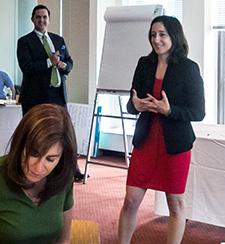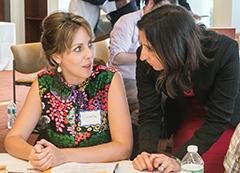Mediation Program Trains New Generation of Problem Solvers
The Edson Queiroz Foundation Mediation Program's Interactive Sessions Train Students and Practitioners in Alternate Dispute Resolution Techniques
New York, October 6, 2014—U.N. diplomats, practicing lawyers and even a judge joined Columbia Law School students for several days in early September to take part in an intensive mediation skills training offered by the Edson Queiroz Foundation Mediation Program.
| Professor Alexandra Carter '03 and Shawn Watts '12 lead the mediation training sessions for students, lawyers, and U.N. diplomats. |
The participants, including officials from Paraguay and Ireland and Brazilian students from the Law School’s partner in the Queiroz Program, the University of Fortaleza, immersed themselves in time-tested mediation practices. In a series of lectures, conversations, break-out sessions and more, they covered topics ranging from active listening and validating perspectives to breaking impasses and finding common ground.
Professor Alexandra Carter ’03, director of the Queiroz program and the Law School’s clinical curriculum, led the training, demonstrating how constructive, empathetic mediation and conflict resolution can foster collaboration among disputing parties and keep tough cases out of the courts.
“The mediator’s role is to flesh out people’s stories and help parties explore their own stories and those of others,” Carter said. “Mediation helps reintroduce parties to one another and develop understanding of others’ experience.”
| Professor Carter confers with Darelle O'Keeffe, political advisor to the Permanent Mission of Ireland to the United Nations. |
Carter and Shawn Watts ’12, associate director of the mediation program, led a variety of role-playing sessions designed to prepare participants for challenges they will face. Attendees also had the opportunity to meet with Justice Kelly O’Neill Levy, a veteran of the Harlem Small Claims court, to learn about resolving issues on a day-to-day basis.
In one session, held on the anniversary of 9/11, Carter recalled the experience of being in New York City that day, and the air of paranoia that lingered long afterwards.
“Some people were targeted and discriminated against because of their ethnicity, and it was hard for a long time for people to disagree on foreign affairs,” Carter said. “It couldn’t be more appropriate on this anniversary that we’re here waging peace instead of war, and learning to have difficult conversations locally, regionally, nationally, and transnationally.”
Mediation has become an increasingly powerful and popular legal tool in recent years, as lawyers and clients have sought creative and flexible ways to resolve disputes. The Edson Queiroz Foundation Mediation Program was established in 2013 as a partnership between Columbia Law School and the University of Fortaleza.
| Participants in the training collaborate in small groups and breakout sessions designed to simulate the kinds of real-world challenges that mediators work to resolve. |
“Personally, the time in New York City opened my mind to what law means,” said Viviane Pontes, who traveled from Brazil for the training. “I live in a country that does not have mediation culture well-established, and think every day how in my life as a lawyer I can apply all the skills I learned in the mediation training. It will be challenging because we must first change the culture of how one can deal with the law in Brazil, but I’m sure it will be a great win for our society.”
"It’s been a long time since I’ve been exposed to a course that would give me key tools to use in my everyday work and life,” said Julia A. Maciel González of the Permanent Mission of Paraguay to the United Nations. “I don't remember the last time I so enjoyed learning from both theory and practice in a multidisciplinary environment, where the diversity made the learning experience even more interesting."
The Law School’s mediation clinic was founded in 1992 by Clinical Professor of Law Carol B. Liebman and is now part of the Law School’s Alternative Dispute Resolution program. The Edson Queiroz Foundation was founded in 1971 by the Edson Queiroz Group, a Brazilian conglomerate, to promote development in northeast Brazil through education and vocational training. The Foundation established the University of Fortaleza, which holds classes in English, in 1973.


